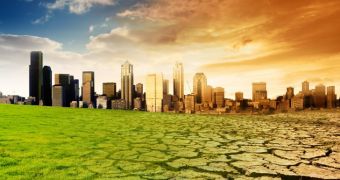Unless you live under a rock, in the middle of nowhere, you've probably heard folks going on and on about how climate change and global warming are bad for us and the planet, and about how we should curb environmental pollution before it is too late and the world turns topsy-turvy right before our eyes.
I've been writing about climate change and global warming for about two years now, but, for some reason, I've mostly (better said, only) focused on their causes and their effects.
However, it has recently crossed my mind that perhaps it would not be such a bad idea to also take the time and explain what these two phenomena are.
Thus, this editorial and the one you will get to read next week were born. Plot synopsis: today we will be talking about climate change, and next week you will get the chance to become acquainted with its dear old friend, global warming.
These being said, let us waste no more precious time, and let us get on with detailing what this climate change that scientists keep badmouthing and warning us about is.
Weather vs. Climate
There is this a mistake that people tend to make, and, from where I stand, is it important that we get this out of the way first. This mistake is equating climate with weather, when, in fact, they are not one and the same thing.
Simply put, weather is defined as conditions of the atmosphere that are documented over fairly short periods of time ranging from minutes to months. In other words, weather is the way the atmosphere is behaving.
For a better understanding of things, it need be said that there are a whole lot of components that make up weather, i.e. sunshine, cloud cover, winds, hail, rain, snow, blizzards, ice storms, thunderstorms, excessive heat, and more.
Climate, on the other hand, is defined as the pattern of weather documented in a given region, over a period of time of at least 30 years. If you prefer, climate is the how our planet's atmosphere behaves over long periods of time.
To figure out the climate of one region or another, scientists have to compile and analyze information concerning averages of precipitation, temperature, humidity, wind velocity, sunshine, fog, and the like.
Based on this data, researchers can tell us whether, during one not-so-happy summer, an area happens to be drier or wetter than what has been documented to be the average. Should an area be drier or wetter than average over an extended period of time, this could indicate a chance in the climate.
Climate Change in a Nutshell
As explained, climate is the average weather documented in a region over an extended period of time. This means that, when we say climate change, we are really talking about shifts in the average weather of an area or another.
These shifts include changes in the local patterns of temperature, precipitation (be it rain or snow), humidity, wind, and even seasons.
What's interesting is that, whereas changes in weather are observed immediately, i.e. the sky goes from being sunny to being cloudy in just a few hours, and everybody notices it, it takes people quite a while to figure out that something is off climate-wise.
In case anyone was wondering, the best way to tell whether or not the climate is changing is making observations on whether or not the past continues to be a reliable indicator for the future.
For example, if your grandparents have experienced tolerable summers for most of their lives, and they are now telling you that present day summers are simply hotter than any of the ones in previous years, look no further than climate change for an explanation.
Why Should We Care That the Climate Is Changing?
OK, so our planet's climate is changing. Therefore, we won't be able to predict future weather conditions based on weather conditions documented in the past. It is really that big of a deal, especially when there is this widespread belief that change and a pinch of unpredictability make life just spicy enough to be worth living?
Truth be told, climate change does sound pretty good when you put it like this. However, there is one not-so-small problem: climate patterns influence and shape natural ecosystems, and we might live in concrete jungles these days, but we are still very much dependent on nature.
Thus, even a small shift in rain and temperature patterns can mess up not just ecosystems in remote parts of the world, but also the crops that human society heavily relies on. So, yes, we should care about climate change and do our best to limit it.
Here's hoping you've found this editorial well worth 10 minutes of your time, and don't forget that a new one on global warming will be delivered to you next Sunday.

 14 DAY TRIAL //
14 DAY TRIAL //